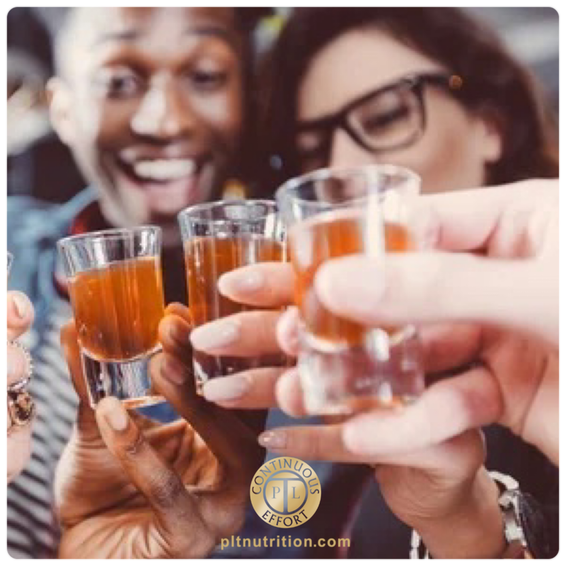|
All about alcohol... 🍺🍷🍹🥂
~ Maxine, Registered Dietitian Let me start off with the most important part- Your alcohol consumption is a personal decision. At PLT Nutrition we don’t ask or expect our clients to completely stop drinking alcohol. We follow a #flexibledieting weight-loss approach which means that you can enjoy an occasional drink without feeling like you’ve ‘fallen off track’ of the program. However, reducing your alcohol intake is something that we often encourage due to the negative effects alcohol has on your health and weight loss. Now let’s get into the science!🤓 Did you know that alcohol is classified as a depressant, even though it can make you feel all kinds of happy? It slows down your central nervous system which causes a decrease in coordination, reaction time and brain function. Alcohol contains 7cal/g which is in between carbs & protein (4cal/g) and fat (9cal/g). Interestingly, the calories you consume through alcohol have shown to provide no satiation unlike macros. Researchers have found that alcohol affects an area of the brain that controls your appetite. It causes intense hunger, especially the day after drinking. A 2017 study interestingly found that nerve cells in the brain triggered by actual starvation can also be stimulated by alcohol (https://www.nature.com/articles/ncomms14014) Those are just two of the many reasons why drinking can easily lead to overeating and a lack of restraint. How does alcohol move through your body?🩸 Approximately 20% of alcohol is absorbed through the stomach and most of the remaining 80% is absorbed through the small intestine. Alcohol is metabolized by enzymes in the liver. In general, your liver can process one ounce of liquor (a standard drink) in one hour. When you drink alcohol at a faster rate than your liver can process, it ends ups in your bloodstream. Your body usually uses the food you’ve consumed on a first come, first-serve basis. When alcohol enters your body it cuts to the front of the line, becoming the body’s primary fuel source. While it might sound like a good thing that your alcohol calories are being used, it’s bad news for the food in your stomach. The liver will prioritize alcohol before carbs and fats so the energy from your food goes unused and is stored as body fat. Weight gain📏 The calorie content of alcoholic drinks can be very deceptive. A 5oz serving of wine has 120 calories, but who’s actually pouring a glass of 5oz wine? A typical wine glass holds 12-25 oz (and wine glasses are getting even bigger) so you do the math.😱 Cocktails are another story entirely and can easily reach up to 600cal per glass. Always opt for low calorie drinks and do your research. Hormones 💊 Alcohol consumption is linked to a decreased testosterone production in men and decreased progesterone levels for women. A long-term high intake of alcohol will lead to a large disruption of the hormone-controlling endocrine system. Sleep😴 Alcohol does help you fall asleep faster but only for the first half of the night. It has shown to increase sleep disruptions and decreases REM sleep throughout the night. Less REM sleep can lead to drowsiness the next day as well as poor concentration, and you guessed it- further sleep disruptions! Alcohol has also been found reduce the amount of melatonin that your body creates which also interrupts your daily sleep cycle. Sleep deprivation increases your stress hormones which makes it more difficult to burn fat and greatly effects your appetite. Digestion 💩 Your digestive system treats alcohol as a toxin, and it works hard to remove it from your body. Alcohol can trigger stress on the stomach and intestines as well as decrease digestive secretions and negatively impact your gut microbiome. This reduces how many nutrients your body breaks down and absorbs. This one is for the woman💁♀️ Because of several physiological reasons, women will feel the effects of alcohol more than a man (even if they are the same size). There is increasing evidence that women are also more susceptible to alcohol's damaging effects. This is due to:
As if this wasn’t enough bad news for us woman, here comes the final punch. Sorry for the red wine drinkers!🍷 A large study that was published in March this year (led by a team from Massachusetts General Hospital, MIT and Harvard) analyzed the connection between alcohol consumption and heart health. They found that drinking any amount (even a low consumption) was associated with an increased risk of heart disease. That risk increased drastically with a higher intake. (https://jamanetwork.com/journals/jamanetworkopen/fullarticle/2790520?resultClick=3) Research has suggested resveratrol 🍇(found in grape skins and berries) may act like an antioxidant and positively contribute to heart health. In 2016 it was found that a person would have to drink at least 17000 oz / 500 L of red wine per day to get enough resveratrol to benefit from it. 😳(https://www.ncbi.nlm.nih.gov/pmc/articles/PMC4942868/) Labeling⚠️ Researchers are now advocating for an update on alcohol warning labels. The current labeling has not changed for 30 years and focuses only on risks during pregnancy, operating machinery and a statement that alcohol “may cause health problems.” This is believed to be misleading as there is now firm evidence of harm. Alcohol has been classified by the International Agency for Research on Cancer as a group 1 carcinogen. It has been linked to an increased risk of many cancers as well as a wide range of diseases including liver disease, pancreatitis, and heart disease. What can you do?🤔 In my opinion, drastically limiting or abstaining from alcohol is the best way to improve your health and achieve the most success on your weight loss journey. Here are some ideas if you are trying to cut back:
Comments are closed.
|
AuthorI'm Paul Leonard, CEO & founder of PLT Nutrition. Categories
All
|
|
Current PLT Members
|
Quick Links
|
Connect With Us
|



 RSS Feed
RSS Feed
